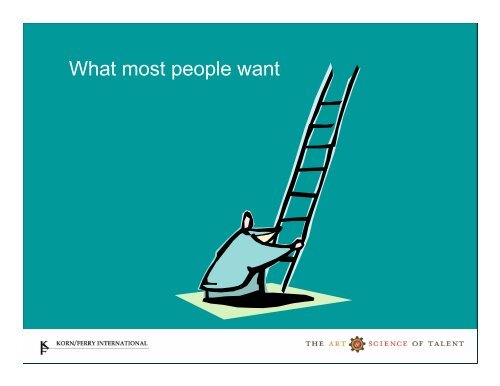Presentation by Bonnie Crabtree, Korn/Ferry International
Presentation by Bonnie Crabtree, Korn/Ferry International Presentation by Bonnie Crabtree, Korn/Ferry International
What most people want
- Page 2 and 3: What most careers look like
- Page 4 and 5: We developed a deeply researched an
- Page 6 and 7: Thinking (operating) styles (decisi
- Page 8 and 9: The Successful CFO Leadership Style
- Page 10 and 11: The Successful CFO Emotional Profil
- Page 12 and 13: Our group - Thinking Styles (Decisi
- Page 14 and 15: It’s the behavior, stupid . . .
What most people want
What most careers look like
It’s the behavior, stupid . . .<br />
“Research shows that most executives fail or<br />
succeed because of behavioral or cultural<br />
issues, not because of skill and experience.<br />
It therefore seems odd that most of the<br />
emphasis in business education, succession<br />
planning and hiring still focuses almost<br />
exclusively on skills and experience.”<br />
Warren Bennis
We developed a deeply researched and<br />
validated model for executive success
Leadership (role) styles<br />
(communicating, influencing, motivating)<br />
2.00<br />
Most successful executives and managers<br />
1.50<br />
Averaged Standardized Assessment Scores<br />
1.00<br />
0.50<br />
0.00<br />
-0.50<br />
-1.00<br />
-1.50<br />
-2.00<br />
Supervisor Manager Director Vice-president Executive<br />
Task Social Intellectual Participative
Thinking (operating) styles<br />
(decision making, problem solving)<br />
1.00<br />
Most successful executives and managers<br />
0.80<br />
Averaged Standardized Assessment Scores<br />
0.60<br />
0.40<br />
0.20<br />
0.00<br />
-0.20<br />
-0.40<br />
-0.60<br />
-0.80<br />
-1.00<br />
Supervisor Manager Director Vice President Sr. Executive<br />
Action-focused Flexible Complex Creative
Emotional competencies<br />
(Dealing with emotionally laden situations)<br />
Most successful executives and managers<br />
0.5<br />
0.4<br />
Averaged Standardized Assessment Scores<br />
0.3<br />
0.2<br />
0.1<br />
0.0<br />
-0.1<br />
-0.2<br />
-0.3<br />
-0.4<br />
Supervisor<br />
Manager<br />
Director<br />
Vice President<br />
Executive<br />
Ambiguity Composure Empathy Energy<br />
Humility<br />
Confidence
The Successful CFO Leadership Style<br />
(Communicating, influencing, motivating)<br />
7.00<br />
6.00<br />
5.00<br />
Highly approachable<br />
Actively listens<br />
Receptive to others' ideas<br />
Fosters teamwork<br />
Builds consensus<br />
Resolves conflict<br />
Solicits ideas<br />
4.00<br />
3.00<br />
2.00<br />
Doesn't micro-manage<br />
Allows others room to succeed or fail<br />
Credible<br />
Projects expertise<br />
Demands quality<br />
1.00<br />
Task Social Intellectual Participative
The Successful CFO Thinking Style<br />
(Decision making, problem solving)<br />
7.00<br />
6.00<br />
5.00<br />
4.00<br />
Can "pull the trigger"<br />
Can make focused decisions<br />
Values research & data<br />
Handles complexity<br />
Sees longer-term implications<br />
Analytic<br />
Sees multiple possibilities<br />
Creative<br />
3.00<br />
2.00<br />
Changes position reluctantly<br />
Not easily swayed <strong>by</strong> passion<br />
1.00<br />
Action Flexible Complex Creative
The Successful CFO Emotional Profile<br />
(Dealing with emotionally laden situations)<br />
(Dealing with emotionally CFO Emotional laden Success situations)<br />
Profile<br />
7.00<br />
6.00<br />
5.00<br />
Maintains self-control<br />
under pressure<br />
Stamina to deal with<br />
complex or difficult<br />
challenges<br />
Good capacity to<br />
take calculated risk<br />
4.00<br />
Will give credit<br />
to others<br />
3.00<br />
Reads others well<br />
2.00<br />
Not comfortable<br />
with the unexpected<br />
1.00<br />
Ambiguity Tol Composure Empathy Energy Humility Confidence
Our group – Leadership Styles<br />
(Communicating, influencing, motivating)<br />
Leadership Styles<br />
7<br />
6<br />
5<br />
Direct and assertive<br />
Not consensus driven<br />
4<br />
3<br />
2<br />
1<br />
Task Social Intellectual Participative<br />
CFO BiC Profile CFO Profile Average 1 Group 12 Average<br />
16 22 28 30
Our group – Thinking Styles<br />
(Decision making, problem solving)<br />
7<br />
Thinking Styles<br />
Highly Analytical<br />
6<br />
5<br />
Careful decision making<br />
4<br />
3<br />
2<br />
1<br />
Action Flexible Complex Creative<br />
CFO BiC Profile Average CFO Profile 1 12 Group Average 16 22 28 30
Our group – Emotional competencies<br />
(Dealing with emotionally laden situations)<br />
7<br />
Emotional Competencies<br />
6<br />
5<br />
Decompose problems<br />
into manageable pieces<br />
Low risk tolerance<br />
4<br />
3<br />
2<br />
1<br />
Ambiguity Composure Empathy Energy Humility Confidence<br />
CFO BiC Profile<br />
CFO<br />
Average<br />
Profile<br />
1Group Average<br />
12 16 22
It’s the behavior, stupid . . .<br />
“Research shows that most executives fail or<br />
succeed because of behavioral or cultural<br />
issues, not because of skill and experience.<br />
It therefore seems odd that most of the<br />
emphasis in business education, succession<br />
planning and hiring still focuses almost<br />
exclusively on skills and experience.”<br />
Warren Bennis
Thank you very much . . .<br />
<strong>Bonnie</strong> <strong>Crabtree</strong><br />
<strong>Korn</strong>/<strong>Ferry</strong> <strong>International</strong>



